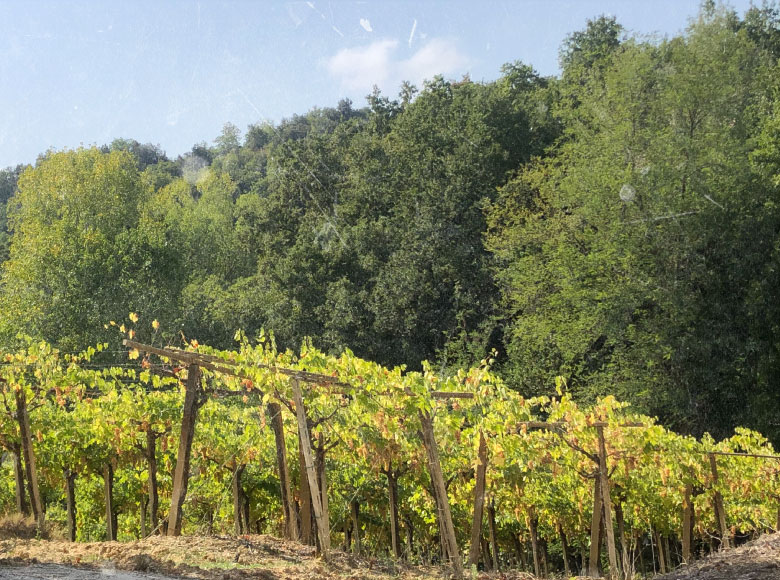
The terroir: the uniqueness of our wines
The term terroir means the result of a system in which natural, biological and human factors are in iteration with each other, bringing everything to high biodiversity values.
The territory of Canosa Sannittica is a well-defined area where the geographical, chemical-physical soil and climatic conditions allow the creation of specific wines that can be identified through the unique characteristics of their territoriality.
THE CLIMATE
Positioned at the foot of the eastern Majella, in the part of the Apennines closest to the coast (just 20km away) and near one of the two highest peaks (Monte Amaro, 2797m), our lands acquire exclusive climatic characteristics.
The gentle inclination of the mountain slopes generate breezes that lead the climate to be milder and with little humidity.
The resulting temperature difference, with hot and cold morning temperatures in the evening, combined with the low humidity, thicken the skin of the grapes, giving birth to wines with a more vibrant color, a more aromatic taste and higher levels of “sugars, aromas, anthocyanins, polymerizable polyphenols “.
THE TERRITORY
The soil also plays its part: the chemical-physical characteristics of the soil greatly affect the finished product.
The vineyards of Cantina Sannitica arise on two types of soil: “medium texture” and calcareous soils.
“Medium-textured” soils are the best for agriculture as they contain a good presence of silt which helps a balanced growth of crops.
On the other hand, the calcareous soils are permeable, that is, they retain little water, and in this way avoid an excessive surplus of growth of the berries and respect the right times of growth, particularly during the ripening period of the grapes, also bringing more aromatic substances, especially in white wines.
We respect and protect the biodiversity
Our commitment to organic farming is always growing.
We enhance the presence of hummus in the soil to improve plant life and product quality, and we do this by using high quality organic fertilizers that increase the levels of organic substances in the soil. We do not use fertilizers containing sludge or industrial by-products, no substances containing heavy metals, in favor of fungi and good bacteria that repopulate the microbiological flora of the territory.
We scrupulously follow the regulations, looking to the future and keeping the required standards even higher.
Always with a view to improving the organic matter in the soil, we use the “green manure” technique: a practice that involves fertilizing the soil by planting certain herbaceous species to allow the soil to recharge itself of the substances lost during grape cultivation and protecting the soil from erosion phenomena. The plants chosen are local varieties of grasses and legumes, such as barley, oats and field beans, and many other herbaceous families. This allows the well-being not only of the physical territory, but also of its climatic condition. Thanks to the flowering of these crops and of the proximity of the vineyards to the woods, we are able to guarantee and preserve the presence in the area of bees engaged in pollination, fundamental animals for safeguarding the environment.

The qualities of our vines
Trebbiano d'Abruzzo
A classic white vine producing lean wines whose production is exclusive to the Abruzzo.
Montepulciano d'Abruzzo
King of the Abruzzo vines, in the rest of Italy it is widespread especially in the Adriatic area.
The finished product is an intended ruby-purple liquid.
Pecorino
The origin of the name comes from the places where this variety is grown, namely the hilly lands also used for sheep farming.
It is a white grape variety that ripens very early, the stretch wine is of a rich yellow-green color.
Primitivo
Vigorous vine of Apulian origin, it suffers a lot from drought and excess humidity, therefore it needs a climatically balanced habitat.
The wine produced is dark to the eye and full-bodied to the taste.
Merlot
Black grape variety of French origin, it is one of the most used in Italy. It seems that the fruit is favored by blackbirds, hence the name.
The wine obtained is a red with a particular dry taste.
Passerina
It is a native of Italy central zone, and it is collocated in the Trebbiano’s family.
It’s a vigorous wine with a sugar dose in the composition of the finished product, also with a good acidity.
Cococciola
It is a native white grape variety of Abruzzo, especially Chieti’s area.
It has good productivity and has no particular climatic needs.


